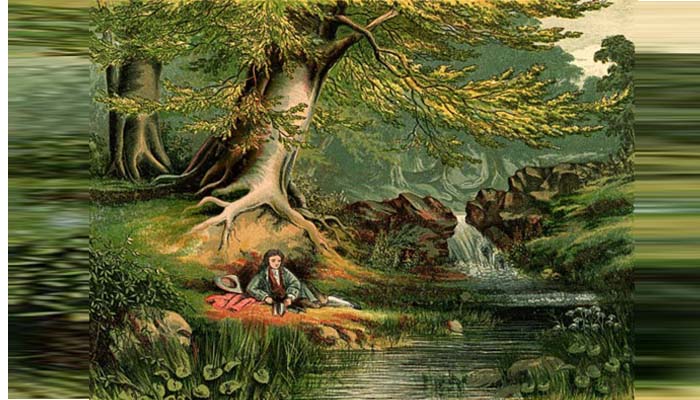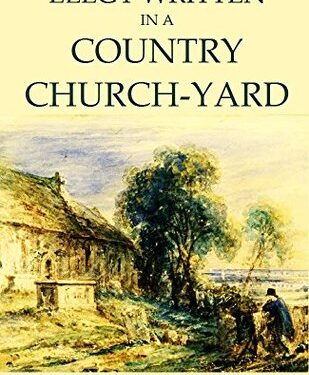Elegy Written in a Country Churchyard Summary by Thomas Gray
“Elegy Written in a Country Churchyard” is a reflective and melancholic poem written by Thomas Gray.
The poem, which was initially released in 1751, is well known for its analysis of aging, mortality, and the inherent worth of the common person. One of the greatest elegies ever written in English, according to many.
In the poem’s first lines, the speaker describes the setting, a rural churchyard at dusk. As the sun sets, the evening bell, which heralds the end of the day and the beginning of the night, tolls. The speaker reflects on the tranquil atmosphere of the churchyard, which stems from the rural surroundings and the simplicity of nature.
Elegy Written in a Country Churchyard Summary
The first poetry sets the tone for the elegy, and the speaker expresses the idea that the lives of the humble villagers buried in the churchyard are just as significant as those of the rich and powerful. He suggests that the untold stories of these common people deserve to be remembered and celebrated.
The second poetry explores the idea that many people live and die in obscurity, their talents and virtues unnoticed by the world. The speaker reflects on the unfulfilled potential and unexplored talents of these individuals, suggesting that they may have had the capacity for greatness if given the opportunity.
In the third poetry, the speaker reflects on the simple joys and sorrows of life that the villagers experienced. He mentions the pleasures of family and friendship, as well as the hardships of poverty and toil. The speaker implies that despite their humble circumstances, these individuals led meaningful lives, and their experiences were just as valid as those of the more privileged.
Also Read-
The fourth poetry introduces the theme of the passage of time and the inevitability of death. The speaker describes how time erases the distinctions between people, leveling the differences between the rich and the poor. Death is portrayed as a great equalizer, reducing everyone to the same state of mortality.
The fifth poetry reflects on the unfulfilled ambitions and dreams of the deceased. The speaker imagines the potential for greatness that may have existed in these individuals but was never realized. He laments the fact that these villagers were denied the opportunity to achieve their full potential and make a lasting impact on the world.
The sixth poetry addresses the theme of the transience of human achievements. The speaker acknowledges that even the grandest monuments and memorials will eventually crumble and fade away. He contrasts the fleeting nature of human accomplishments with the eternal beauty of nature, suggesting that the latter is a more enduring and meaningful legacy.
In the seventh poetry, the speaker expresses the idea that the true value of a person is not determined by external factors such as wealth or social status but by their internal qualities and character. He suggests that virtue and goodness are the qualities that truly distinguish one individual from another.

The eighth poetry returns to the imagery of the churchyard at sunset, reinforcing the theme of the passage of time. The speaker reflects on the inevitability of death and the universal fate that awaits all living beings. He emphasizes the idea that death is a natural and unavoidable part of the human experience.
In the ninth and final poetry, the speaker imagines a hypothetical scenario in which a humble villager is buried in the churchyard. He envisions a simple epitaph on the villager’s gravestone, emphasizing the individual’s virtues and the universal human experience of mortality. The poem ends with a reflection on the shared fate of all humanity and the idea that death is a common bond that unites us all.
Elegy Written in a Country Churchyard Poem
The curfew tolls the knell of parting day,
The lowing herd wind slowly o’er the lea,
The plowman homeward plods his weary way,
And leaves the world to darkness and to me.
Now fades the glimm’ring landscape on the sight,
And all the air a solemn stillness holds,
Save where the beetle wheels his droning flight,
And drowsy tinklings lull the distant folds;
Save that from yonder ivy-mantled tow’r
The moping owl does to the moon complain
Of such, as wand’ring near her secret bow’r,
Molest her ancient solitary reign.
Beneath those rugged elms, that yew-tree’s shade,
Where heaves the turf in many a mould’ring heap,
Each in his narrow cell for ever laid,
The rude forefathers of the hamlet sleep.
The breezy call of incense-breathing Morn,
The swallow twitt’ring from the straw-built shed,
The cock’s shrill clarion, or the echoing horn,
No more shall rouse them from their lowly bed.
For them no more the blazing hearth shall burn,
Or busy housewife ply her evening care:
No children run to lisp their sire’s return,
Or climb his knees the envied kiss to share.
Oft did the harvest to their sickle yield,
Their furrow oft the stubborn glebe has broke;
How jocund did they drive their team afield!
How bow’d the woods beneath their sturdy stroke!
Let not Ambition mock their useful toil,
Their homely joys, and destiny obscure;
Nor Grandeur hear with a disdainful smile
The short and simple annals of the poor.
The boast of heraldry, the pomp of pow’r,
And all that beauty, all that wealth e’er gave,
Awaits alike th’ inevitable hour.
The paths of glory lead but to the grave.
Nor you, ye proud, impute to these the fault,
If Mem’ry o’er their tomb no trophies raise,
Where thro’ the long-drawn aisle and fretted vault
The pealing anthem swells the note of praise.
Can storied urn or animated bust
Back to its mansion call the fleeting breath?
Can Honour’s voice provoke the silent dust,
Or Flatt’ry soothe the dull cold ear of Death?
Perhaps in this neglected spot is laid
Some heart once pregnant with celestial fire;
Hands, that the rod of empire might have sway’d,
Or wak’d to ecstasy the living lyre.
But Knowledge to their eyes her ample page
Rich with the spoils of time did ne’er unroll;
Chill Penury repress’d their noble rage,
And froze the genial current of the soul.
Full many a gem of purest ray serene,
The dark unfathom’d caves of ocean bear:
Full many a flow’r is born to blush unseen,
And waste its sweetness on the desert air.
Some village-Hampden, that with dauntless breast
The little tyrant of his fields withstood;
Some mute inglorious Milton here may rest,
Some Cromwell guiltless of his country’s blood.
Th’ applause of list’ning senates to command,
The threats of pain and ruin to despise,
To scatter plenty o’er a smiling land,
And read their hist’ry in a nation’s eyes,
Their lot forbade: nor circumscrib’d alone
Their growing virtues, but their crimes confin’d;
Forbade to wade through slaughter to a throne,
And shut the gates of mercy on mankind,
The struggling pangs of conscious truth to hide,
To quench the blushes of ingenuous shame,
Or heap the shrine of Luxury and Pride
With incense kindled at the Muse’s flame.
Far from the madding crowd’s ignoble strife,
Their sober wishes never learn’d to stray;
Along the cool sequester’d vale of life
They kept the noiseless tenor of their way.
Yet ev’n these bones from insult to protect,
Some frail memorial still erected nigh,
With uncouth rhymes and shapeless sculpture deck’d,
Implores the passing tribute of a sigh.
Their name, their years, spelt by th’ unletter’d muse,
The place of fame and elegy supply:
And many a holy text around she strews,
That teach the rustic moralist to die.
For who to dumb Forgetfulness a prey,
This pleasing anxious being e’er resign’d,
Left the warm precincts of the cheerful day,
Nor cast one longing, ling’ring look behind?
On some fond breast the parting soul relies,
Some pious drops the closing eye requires;
Ev’n from the tomb the voice of Nature cries,
Ev’n in our ashes live their wonted fires.
For thee, who mindful of th’ unhonour’d Dead
Dost in these lines their artless tale relate;
If chance, by lonely contemplation led,
Some kindred spirit shall inquire thy fate,
Haply some hoary-headed swain may say,
“Oft have we seen him at the peep of dawn
Brushing with hasty steps the dews away
To meet the sun upon the upland lawn.
“There at the foot of yonder nodding beech
That wreathes its old fantastic roots so high,
His listless length at noontide would he stretch,
And pore upon the brook that babbles by.
“Hard by yon wood, now smiling as in scorn,
Mutt’ring his wayward fancies he would rove,
Now drooping, woeful wan, like one forlorn,
Or craz’d with care, or cross’d in hopeless love.
“One morn I miss’d him on the custom’d hill,
Along the heath and near his fav’rite tree;
Another came; nor yet beside the rill,
Nor up the lawn, nor at the wood was he;
“The next with dirges due in sad array
Slow thro’ the church-way path we saw him borne.
Approach and read (for thou canst read) the lay,
Grav’d on the stone beneath yon aged thorn.”
THE EPITAPH
Here rests his head upon the lap of Earth
A youth to Fortune and to Fame unknown.
Fair Science frown’d not on his humble birth,
And Melancholy mark’d him for her own.
Large was his bounty, and his soul sincere,
Heav’n did a recompense as largely send:
He gave to Mis’ry all he had, a tear,
He gain’d from Heav’n (’twas all he wish’d) a friend.
No farther seek his merits to disclose,
Or draw his frailties from their dread abode,
(There they alike in trembling hope repose)
The bosom of his Father and his God.
Conclusion
“Elegy Written in a Country Churchyard” by Thomas Gray is a timeless exploration of the human condition, mortality, and the significance of ordinary lives.
The poem, which celebrates the potential and qualities inherent in the ordinary lives of individuals, masterfully depicts the spirit of living in a rural setting. Gray challenges readers to consider the fate of mankind as a whole and the enduring significance of leading straightforward but meaningful lives through striking imagery and thoughtful analysis.

The elegy invites readers to consider the transient character of human accomplishments, the certainty of death, and the superiority of inner qualities over outward distinctions. The poem’s moving lines reflect on the impermanence of life and the equality that comes with death for everyone.
FAQ:
1. What is the main theme of “Elegy Written in a Country Churchyard”?
The main themes of the poem include mortality, the passage of time, the equality of death, and the intrinsic value of ordinary lives. The speaker reflects on the lives of common villagers buried in a country churchyard, emphasizing that their experiences and virtues are just as significant as those of the wealthy and powerful.
2. How does Gray explore the theme of mortality in the elegy?
Gray explores the theme of mortality by depicting the inevitability of death as a universal experience that transcends social and economic distinctions. He reflects on the transience of human achievements and emphasizes that death is a great equalizer, reducing all individuals to the same state of mortality.
3. What is the significance of the rural setting in the poem?
The rural setting of the country churchyard serves as a backdrop for the contemplation of life and death. The simplicity of the setting underscores the idea that the virtues and experiences of ordinary people, often overlooked in grander narratives, are worthy of recognition and remembrance.
4. How does the poem address the idea of human potential and unfulfilled ambitions?
The elegy touches upon the idea that many individuals buried in the churchyard may have had unexplored talents and unfulfilled potential. Gray imagines the unrealized greatness that these common people might have achieved if given the opportunity, highlighting the tragedy of unfulfilled ambitions.
5. What is the significance of the poem’s title, “Elegy Written in a Country Churchyard”?
The title sets the tone for the reflective and mournful nature of the poem. It informs readers that the elegy is set in a rural churchyard, a place associated with burials and remembrance. The choice of setting contributes to the elegy’s exploration of mortality and the value of ordinary lives.
6. How does the poem conclude, and what is the final message conveyed by Gray?
The poem concludes with a hypothetical epitaph for a humble villager, emphasizing the virtues and shared mortality of all humanity. Gray’s final message is a reflection on the universal fate that awaits every individual, highlighting the idea that death is a common bond that unites people regardless of their social status or accomplishments. The elegy encourages readers to appreciate the inherent worth of every life and to recognize the commonality of the human experience.
Related


















